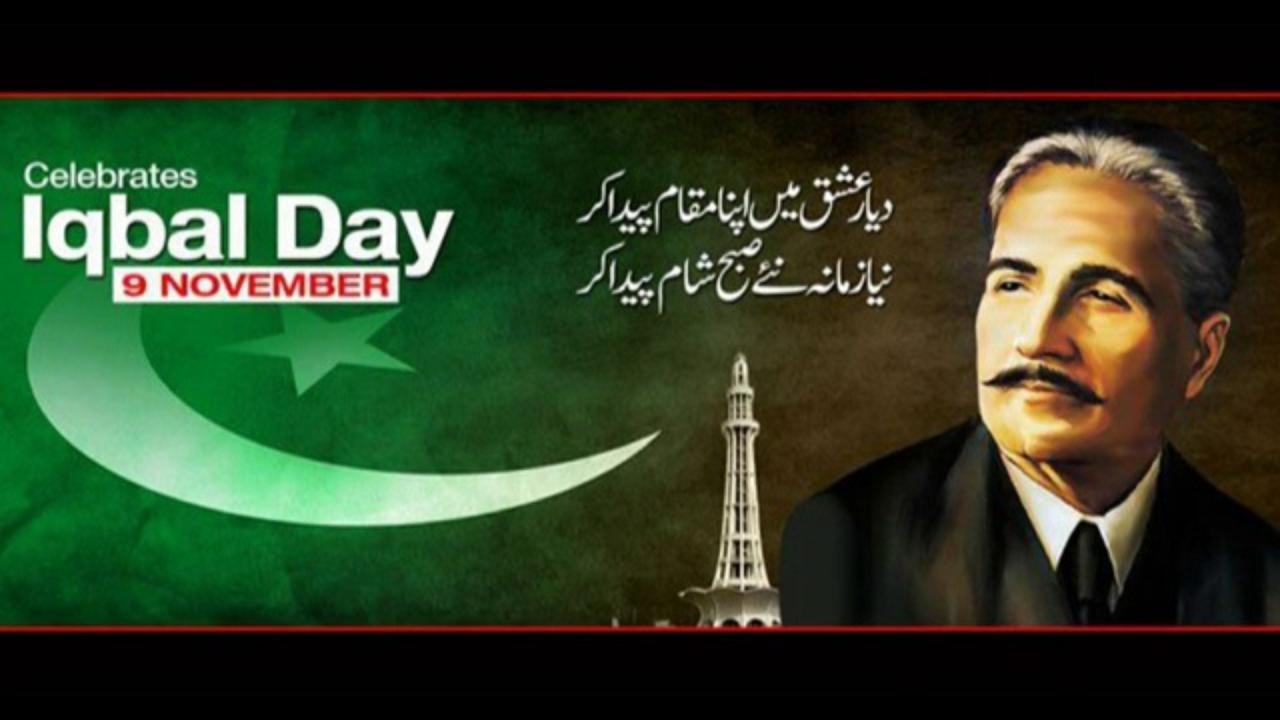Every year on November 9, a series of commemorative celebrations takes place in the republic in honor of the philosopher and public figure Muhammad Iqbal, who is considered one of the main followers of the state’s independence. 9 November Iqbal Day is a public holiday and a day off. Pakistan is celebrating the philosopher’s 143rd birthday this year. On the eve of the celebration, national flags are raised on the main government buildings.
Traditionally, high-ranking Pakistani officials deliver eulogies in memory of the country’s spiritual leader, publish special editions of newspapers, and TV channels broadcast programs dedicated to the activities and achievements of Iqbal. Also, visitors to museums and exhibitions are offered a special program dedicated to the philosopher.
Allama Muhammad Iqbal was born on November 9, 1877. After completing his primary education in his hometown, he entered the government college in Lahar, where he studied English and Arabic literature, as well as the foundational ideas of world famous philosophers.
Iqbal advocated the unification of the Islamic world, and called for the unity of Muslims. He became widely known as a writer who made major contributions to Urdu literature. In Pakistan, he is also considered the national poet.
In many parts of Pakistan and India, as well as in other countries, scientific societies have been created to study the creative heritage of the figure. In addition, the Republican Academy, the Open University in Islamabad, the cricket stadium in Faisalabad and the international airport in Lahore bear his name.
When did Allama Muhammad Iqbal start their poetry?
Allama Muhammad Iqbal started their poetry in his early age. But at that time he was not appreciated much. One evening in November 1899, some sincere classmates took him to Hakim Aminuddin’s house for a poetry recital. Great teachers and poets were present and at the same time there was a good crowd of listeners. Since Iqbal was brand new, his name was called in the beginning. So Iqbal started reciting his ghazal, when he came across this poem:
The glorious pearl of understanding chose the
drops of the dead sweat
So even the best master poets were compelled to pay tribute. This is where Iqbal’s fame as a poet began. After that, Iqbal did not look back and began to be invited to the polls. It was at this time that the Anjuman-e-Hamaat-e-Islam was formed which lasted till the end. He used to speak at his national and welfare meetings and often succeeded in uniting the people. Iqbal’s popularity made many of the association’s tasks easier. Iqbal began to create a sense of religious unity among Muslims at the social level, in which Iqbal’s poetry played a key role.
Iqbal is read in every part of the world and the Muslims of the subcontinent bring this word to their study with great devotion and understand his philosophy. Iqbal instilled a revolutionary spirit in the new generation and highlighted Islamic greatness. Many of his books have been translated into English, German, French, Japanese, Chinese and other languages. Iqbal’s various poems are used as proverbs today. Some of these poems are dedicated to the readers
Erase your being if you want a few times
that the grains will bloom together in the dust
What comes out of the heart has an effect,
but power does not fly
Iqbal is also a great teacher. He is fascinated by words
.
May my
life be like a candle, my God
The temperature throughout the night in the mosque ayman those who
do not like the person I had my old rascal years
Life is created by action. Heaven and hell are also
earthy
Iqbal’s glorious and glorious poem, which still reflects and reflects the situation of Muslims in the same way as it describes the situation about a hundred years ago. Here are some poems
I have courage, I have the courage to speak, I have a body that is
glorious to Allah,
listen to me, O God, glorious Lord of the Faithful, listen to me, even
a little bit of praise
But the name of this poem is “Shikwa” because the subject
There is a cry of Allama Iqbal or contemporary Muslims in the glorious court of God.
Iqbal has expressed the subconscious feelings of ordinary Muslims in his majesty. According to Saleem Ahmed, “On the one hand, they believe that they are the most beloved ummah of God and His Beloved, and therefore deserve all the blessings of God, and on the other hand, it is an undeniable fact that they have perished.” Yes, this clash of faith and reality gives rise to the specific tragedy of Muslims which is the subject of “glory”. It was revealed in the hearts.
There is a lot of debate in the literary circles about Iqbal’s concept of self, but in this regard, in the first edition of the preface of “Israr-e-Khodi” he writes that “yes, the audience is aware of the word” self “. It is important to note that this word is not used in this poem in the sense of “arrogance” as is commonly used in Urdu. Feels paid
Not self pride and swallowed grave and pride in
what you do not enjoy sufficient pride
Another thing that plays an important role in advancing the concept of self. In Iqbal’s words, she sometimes appears before us in the form of desire and sometimes in the form of love. Take a look at some of the poems that reflect these ideas.
Illinois in love with life under the bombs
of love from moment to moment in the soil barbaric images
are described several stages of Iqbal love,
love scribes sanctuary, rich jnud love
love In sbyl, the thousands place
Dr. Abid Hussain, while explaining the path of self and love, writes one of his essays in Iqbal’s concept of self, that
“It simply came to our notice then. And that guide is love. Love is the love of the perfect man who has passed through the stages of self-knowledge and has reached the ascension of the self. ”
The deeds of a man of God, the love of
love is the essence of life, death is forbidden to him
There is a difference between begging and poverty. The beggar spreads his hands in front of others in need of wealth, while begging is to conquer the universe without material pleasures, to rule over nature and to save the oppressed from the clutches of the oppressors.
Teaches that poverty is a fowler nkchry
open the mysteries of a poverty Jahangiri
poor and sorrowful, in nations with a poverty
elixir soil from a property in poverty
Despite all the stages of Iqbal’s self, he feels incomplete. Perhaps this attraction is called true love. That
I also love the veil, Hassan also Hijab
are either worrying or I Issachar
the covers by karan, I just now
or I causes or making me wait the
flush on the provision of pain and burning lust Do
n’t give me a place of worship, glory to God
Man finds peace in servitude. However, this separation is blessed for man because this is the self-cause of life.
In short, we can say that the concept of self is the basic concept of Iqbal’s poetry without which we cannot imagine Iqbal’s poetry. This is the basic brick of Iqbal’s philosophy of life. Iqbal did not use the word self in the sense of pride but It means self-realization or self-determination. This is something that is also mentioned in the hadiths.
Let us understand that the lesson that Iqbal has given us in his speech is actually another name for the instruction to know one’s Lord.
Himself before speaking so that every measure
yourself asking what is your pleasure to God, man
Urdu And Persian Books
- Ilm Ul Iqtisad 1903
- Israr e Khudi 1915
- Ramooz e bekhudi, 1917
- Payam e Mashriq 1923
- Zboor e Ajam 1927
- Javed Nama 1932
- Pus cha karadayi Aqwam e Mashriq 1931
- Armughan e Hijaz (Persian Urdu) 1938
- poetry collections in Bangh e dara 1924
- Ball Gabriel 1935
- Zarb e Kaleem 1936
English books
- Beyond altbyayat evolution in Persia 1908
- Construction of religious thought in Islam in 1930
This great poet of the subcontinent, also known as the poet of the East. He finally passed away on April 21, 1938 in Lahore, leaving behind a void that could never be filled. But his words are still a beacon for us today and will always guide the scholars in the same way. Now in Pakistan, The purpose of 9 November Iqbal day is to memorize their national poet and also the poet of the East.
Read also: Z Library: The Biggest E Library In The World
Quotes to be remembered on 9 November Iqbal day
I have collected some inspirational quotes that everyone should remember on 9 November Iqbal day. In this way, we can be proud to have our great national poet, “Shair-e-Mashriq”.
When love accompanies intelligence, it becomes the architect of another universe! Arise, and draw a new world, unite love with intelligence.
Muhammad Iqbal
Whatever evil is hidden in your heart, you can be sure that its origin is fear. Fraud, cunning, malice, lies, all of this feeds on terror, which is shrouded in the veil of falsehood and hypocrisy, and which holds vile rebellion to its heart.
Muhammad Iqbal
When it is devoid of flame, truth is philosophy; it becomes poetry when it borrows its flame from the heart.
Muhammad Iqbal
A lost heart is better than a hundred genuflections.
Muhammad Iqbal



